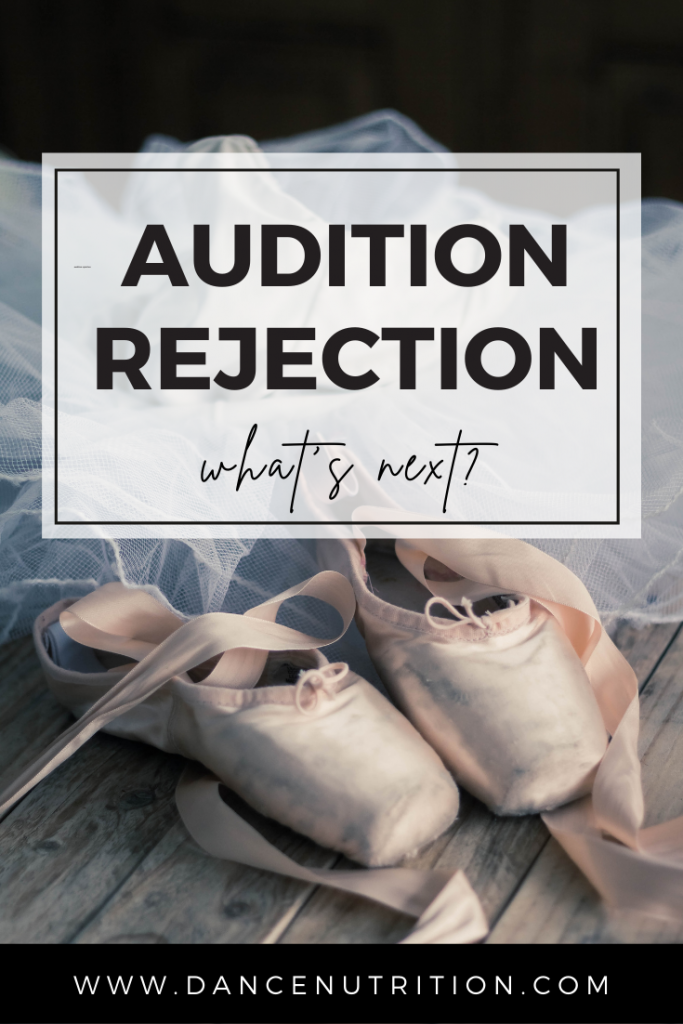Audition season comes with a rollercoaster of emotions: excitement, nerves, hope, and yes, fear. Each audition holds the possibility of acceptance or rejection, and that weight can feel enormous. On top of external feedback from directors, choreographers, teachers, or even parents, many dancers battle their harshest critic: their own inner voice.
The reality? Rejection can feel devastating. So much is outside your immediate control— casting choices, budgets, company repertoire, or the subjective preferences of a director. For dancers who crave control, this uncertainty can be overwhelming and too often, that desire for control shifts to body goals. Would a different body weight have changed the outcome?
Here’s the truth: micromanaging your weight in pursuit of a smaller body is not the key to audition success. In fact, restrictive dieting and overtraining sabotages performance by leading to fatigue, burnout, and injury.
The goal is to approach rejection with strategies that preserve your confidence, your health, and your love of dance. Here’s how:
#1: Validate Your Disappointment
There’s nothing more frustrating than being told to “just get over it.” You’ve poured your heart into preparation, only to hear “no.” Rejection hurts. Acknowledge that. Your feelings are valid.
Give yourself space to process. That might look like journaling, taking a long walk, or even enjoying your favorite childhood ice cream spot. Yes, emotional eating can be one way of coping— and when it’s part of a variety of coping tools, that’s completely okay (read more here about emotional eating as a coping tool).
The bottom line: disappointment is normal. Honoring it is the first step toward moving forward.
#2: Reflect on the Experience
Once you’ve had space to sit with your emotions, revisit the audition with curiosity rather than criticism. Ask yourself:
- Was there something that impacted your performance— like nerves, lack of sleep, or not fueling properly?
- Could feedback help you understand areas of growth? (And remember: if the feedback focuses only on shrinking your body, that’s not about your artistry. It’s a reflection of an environment misaligned with your long-term well-being.)
Sometimes, there’s no clear reason for the rejection. That’s because audition results often have more to do with external factors like company budgets, casting needs, or repertoire style than your talent or work ethic. Rejection is not a reflection of your worth. You bring value far beyond a single director’s decision. There will be a place for you in the dance world, and sometimes it’s simply a matter of timing.
#3: Strategize Your Next Move
When you feel ready, shift into planning mode. Reframing rejection as redirection can be empowering. This will also be a great time to consider your fueling routine.
For summer intensives, college, or company auditions: Create a tiered list of options. Your “reach” programs are those that are hardest to reach, your “middle-ground” possibilities could go either way, and your “safeties” (programs that you know you’ll get into). This ensures you’re not putting all of your hope into one outcome and gives you a practical framework for audition season.
For roles or company promotions: Focus on sustainable strategies that support performance. Instead of restrictive dieting or punishing cross-training, prioritize habits that boost strength, stamina, and artistry. This may include working with a Registered Dietitian Nutritionist for fueling strategies, or a licensed mental health professional to support confidence and resilience.
Remember: rejection now does not mean rejection forever. Where you begin is not where you’ll end.
Final Thoughts
Every dancer will face rejection. It’s part of the journey. But rejection doesn’t define you. What matters is how you respond: with compassion, curiosity, and a plan for sustainable growth.
If you’re looking for more guidance, check out The Healthy Dancer® Survival Guide to Auditions. I designed this as an economical resource with practical tools to support your audition season. For dancers wanting individualized support, Audition Preparation Coaching is open for registration— designed to help you build endurance, confidence, and a sustainable audition strategy.



